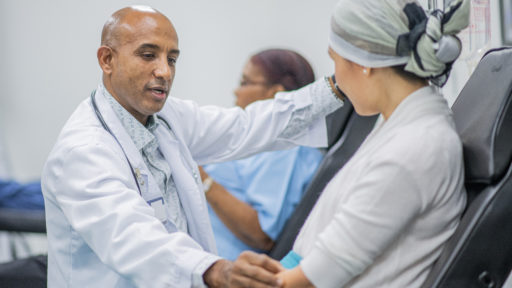Monoclonal Gammopathy of Undetermined Significance (MGUS) is a non-cancerous, or benign, condition characterized by the presence in the blood of an abnormal protein produced by plasma cells. Plasma cells, found in the bone marrow and in blood, normally produce antibodies that fight infection.
The abnormal protein is referred to as an M–protein or paraprotein. It is monoclonal, which means that it is produced by one family of cells that are all identical copies of each other.
MGUS is considered a benign condition, since there is only a small risk that it will develop into myeloma or a related blood cancer. An increase in paraprotein in the bone marrow is often the first sign of progression from MGUS to active myeloma. This excess of the paraprotein impedes the production of healthy blood cells and antibodies that fight infection.
Key Statistics and Risk Factors
The risk of MGUS increases with age. Approximately 3% of adults 50 and older and 5% of adults 70 and older have M-protein in their blood. The highest incidence is among adults 85 and older.
MGUS is about 1.5 times more common in men than in women and is nearly twice as common in African-Americans as in Caucasians.
Signs and Symptoms
There are usually no obvious symptoms associated with MGUS. Occasionally, people with MGUS have numbness or tingling in their hands and feet (peripheral neuropathy), or problems with their balance. This may be due to nerve damage caused by the paraprotein in the blood.
Patients with MGUS should watch for any symptoms, such as bone pain and fatigue, as they might indicate progression to myeloma.
Diagnosing MGUS
MGUS is usually detected incidentally during a routine check-up when a blood test shows an increase in the blood protein level. The diagnosis is then confirmed by having a particular blood test called serum electropheresis which identifies the abnormal antibody.
MGUS is clinically defined as having a paraprotein level of less than 3 grams per deciliter and less than 10 percent plasma cells in the bone marrow. There is no damage to bones, calcium levels are normal, little or no protein is present in the urine, kidney function is normal and there is no anemia (which can result from a low red blood cell count).
Treatment
MGUS does not usually require treatment. In most people, MGUS remains stable and does not ever cause any problems. However, because MGUS can develop into myeloma, regular check-ups are important.
Research at the Myeloma Center suggests that some patients with MGUS are at increased risk for progression to myeloma. Risk is based on clinical variables, such as blood protein levels and results of gene expression profiling and magnetic resonance imaging. In some cases, treatment aimed at preventing progression to active myeloma is indicated.
Prognosis
MGUS is generally considered benign and has no ill effects on overall health or survival. However, regular check-ups are essential, since myeloma typically develops in 1% to 2% of MGUS patients per year. It is important for patients to contact their doctor between check-ups if they develop any new symptoms.
Future
Our expert scientists at the Myeloma Center are researching what causes the progression of MGUS to myeloma, the genetics of MGUS and myeloma and whether personalized treatment may prevent the progression.








